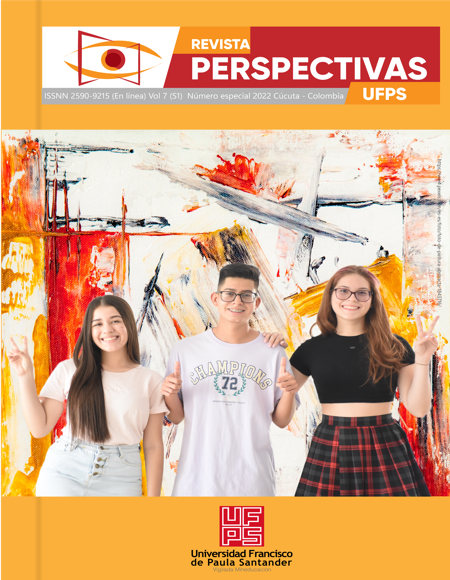Policies for a better quality of life for citizens through inclusive education.
Políticas para una mejor calidad de vida de la ciudadanía a partir de la Educacion inclusiva.
Main Article Content
The purpose of this article is to reflect on the innovative bets in academic training processes to strengthen cognitive learning and the policies that promote inclusive education in Latin America. The methodology applied was analytical-descriptive, through documentary review. As a result, it was possible to identify the contribution of innovative strategies oriented to the development of holistic training processes based on creativity, play supported by technological tools, as well as the advances in terms of inclusive education policies in Colombia and Latin America, which although still insufficient, have contributed significantly to the improvement of cognitive processes in students and increase in the dimensions related to satisfaction, well-being and quality of life.
Downloads
Article Details
Alves, A. G., Schmidt, A. E. F., Carthcat, K. D., &Hostins, R. C. (2015). Exploring technological
innovation towards inclusive education: Building digital games–An interdisciplinary challenge. Procedia-Social and Behavioral Sciences, 174, 3081-3086. https://doi.org/10.1016/j.sbspro.2015.01.1043 DOI: https://doi.org/10.1016/j.sbspro.2015.01.1043
Armstrong, F. (2007). Inclusive education. In Key Issues for Teaching Assistants (pp. 17-28). Routledge. https://doi.org/10.4324/9780203933480 DOI: https://doi.org/10.4324/9780203933480-7
Barreiro Collazo, Alejandra. (2022). Actuaciones y prácticas innovadoras como herramientas para el fomento de la educación inclusiva. En-claves del pensamiento, 16(31), e503. Epub 21 de marzo de 2022.https://doi.org/10.46530/ecdp.v0i31.503 DOI: https://doi.org/10.46530/ecdp.v0i31.503
Cabero Almenara, J., & Fernández Batanero, J. M. (2014). Una mirada sobre las TIC y la educación, inclusiva: reflexiones en torno al papel de las TIC en la educación inclusiva. C & P: Comunicación y Pedagogía, 279-280, 38-42.
Chataika, T. (2022). Inclusive education policies and practices in Malawi and Zimbabwe. https://doi. DOI: https://doi.org/10.1016/B978-0-12-818630-5.12033-0
org/10.1016/B978-0-12-818630-5.12033-0
Cedillo, I. G. (2018). La educación inclusiva en la Reforma Educativa de México. Revista de
Educación Inclusiva, 11(2), 51-62.
Clavijo Castillo, R. G., & Bautista-Cerro, M. J. (2020). La educación inclusiva. Análisis y
reflexiones en la educación superior ecuatoriana. Alteridad. Revista de Educación, 15(1), 113-124.
De Bruin, K. (2019). The impact of inclusive education reforms on students with disability: An DOI: https://doi.org/10.1080/13603116.2019.1623327
international comparison. International Journal of Inclusive Education, 23(7e8), 811e826. https://
doi.org/10.1080/13603116.2019.1623327
Forlin, C. I., Chambers, D. J., Loreman, T., Deppeler,J., & Sharma, U. (2013). Inclusive education
for students with disability: A review of the best evidence in relation to theory and practice Australian Research Alliance for Children and youth. https://researchonline.nd.edu.au/edu_article/141/ Fundación Saldarriaga Concha y Laboratorio de la Economía de la Educación -LEE de la Pontificia
Universidad Javeriana (2022). La Educación en
Colombia para la población con discapacidad:
realidades y retos. Disponible en: https://lee.
javeriana.edu.co
Hehir, T., Grindal, T., Freeman, B., Lamoreau, R.,
Borquaye, Y., & Burke, S. (2016). A Summary
of the Evidence on Inclusive Education. Abt
Associates.
Jones, P. W. (2018). International policies for
Third World education: UNESCO, literacy and
development. Routledge.
Martínez, I. M. (2022). Educación inclusiva a través
de las TIC. Editorial Inclusión.
Moriña, A. (2019). Inclusive education in higher
education: challenges and opportunities.
Postsecondary educational opportunities for
students with special education needs, 3-17.
https://doi.org/10.4324/9781351107570 DOI: https://doi.org/10.4324/9781351107570
Opertti, R., & Belalcázar, C. (2008). Trends in
inclusive education at regional and interregional
Estrategias para mejorar la calidad de vida del ciudadano a partir de políticas de educación incluyente
Perspectivas, 7 (S1), pp. 186-192, 2022, E ISSN: 2590-9215
levels: issues and challenges. Prospects, 38(1),
-135. https://doi.org/10.1007/s11125-008-
-1
Posadas, R. A. Y., & Marín, J. M. R. (2022). Educación
medioambiental: desafíos para la agenda del
desarrollo sostenible del año 2030. Revista
de filosofía, 39(100), 448-460. https://dialnet.
unirioja.es/servlet/articulo?codigo=8331802
Reyes Chávez, R., & Prado Rodríguez, A. B. (2020).
Las Tecnologías de Información y Comunicación
como herramienta para una educación primaria
inclusiva. Revista Educación, 44(2), 506-525.
Romero Martínez, S. J., González, I., García, A., &
Lozano, A. (2018). Herramientas tecnológicas
para la educación inclusiva. Tecnología, ciencia
y educación, 9, 83-111.
Rico, A. P. (2010). Políticas de educación inclusiva
en América Latina: propuestas, realidades y retos
de futuro. Revista de educación inclusiva, 3(2),
-142.
Schot, J., & Steinmueller, W. E. (2018). Three
frames for innovation policy: R&D, systems
of innovation and transformative change.
Research policy, 47(9), 1554-1567. https://doi.
org/10.1016/j.respol.2018.08.011
Stubbs, S. (2008). Inclusive education. Where there
are few resources. Oslo, The Atlas Alliance Publ.
UNESCO (2021). Políticas de educación inclusiva:
estudios sobre políticas educativas en América
Latina. Disponible en https://unesdoc.unesco.
org/ark:/48223/pf0000379487.locale=es
United Nations (2015). Transforming our World:
The 2030 Agenda for Sustainable Development.
Document. https://sdgs.un.org/sites/default/files/
publications/21252030 Agenda for Sustainable
Development web.pdf
Vaccari, V., & Gardinier, M. P. (2019). Toward
one world or many? A comparative analysis
of OECD and UNESCO global education
policy documents. International Journal of
Development Education and Global Learning.
https://doi.org/10.18546/IJDEGL.11.1.05 DOI: https://doi.org/10.18546/IJDEGL.11.1.05
Wray, E., Sharma, U., & Subban, P. (2022). Factors
influencing teacher self-efficacy for inclusive
education: A systematic literature review.
Teaching and Teacher Education, 117, 103800.
https://doi.org/10.1016/j.tate.2022.103800 DOI: https://doi.org/10.1016/j.tate.2022.103800
Ydo, Y. (2020). Inclusive education: Global priority,
collective responsibility. Prospects, 49(3-4),
-101. https://doi.org/10.1007/s11125-020-
-y







